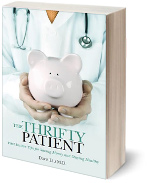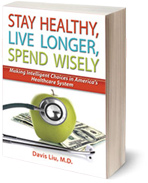Make the Most Out of Your Doctor Office Visit – You Just D.A.T.E.D. Your Doctor!
Book excerpt from The Thrifty Patient -Vital Insider Tips for Saving Money and Staying Healthy
You Just D.A.T.E.D. Your Doctor
You’ve told your story. Your doctor gets it. He has completed the physical exam. He formulates a plan to get you better. The next skill you should master may be as important as being a great storyteller. Your doctor has told you the treatment plan. Do you remember what you need to do?
A 1996 study at the Mayo Clinic showed that patients remember less than half of what physicians tell them during office visits. Of nearly six hundred patients who were asked to recall what diagnoses physicians had discussed with them, 54 percent could not remember the major problems. Of patients whose doctors had discussed with them the risk factors for heart disease, 68 percent did not recall any discussion about tobacco use, 62 percent did not remember hypertension (high blood pressure), and 73 percent did not recall obesity.
Your doctor may provide you with a lot of information after he reaches a treatment plan. It could be overwhelming. We might talk too fast because we do this every day. We often repeat the same recommendations, like quit smoking, lose weight, continue your prescription medication, repeat blood work, ice three times a day, or take the anti inflammatories as prescribed for at least a month. Perhaps we give you too much information.
Sometimes we don’t give you enough information. Either way it is a problem, especially if you don’t remember.
Take the common diagnosis of low back pain. Perhaps the doctor told you it was due to a herniated disc. At least he didn’t say it was cancer. What a relief! Do you remember anything else he said? What was the treatment plan? What did you decide to do? When will the problem resolve? When do you need to come back for a follow-up? Did you talk about other things as well?
Remember your doctor’s recommendations by telling people you D.A.T.E.D. your doctor.
This simple memory trick will provide you the tools to remember everything you need to know to get better sooner and stay healthy. You already took the time and effort to be a great storyteller.
As you leave, it is vitally important you recall what you need to do.
D—Did you understand and remember the (D)iagnosis?
- If not, ask the doctor to write it down, particularly if it is something you haven’t heard before. Get the actual medical terminology rather than the layman’s wording. Bring your own paper and pen if you have to, particularly if this is not a typical visit for something relatively benign, such as a cold. The diagnosis is critical.
A—Does your doctor require or recommend any (A)dditional testing, x-rays, medical records, or procedures?
- Does the doctor need your medical records from other doctors’ offices or hospitals? Is additional input from other doctors, usually specialists, important? If so, do you need a referral or do you self-refer?
T—Is it clear to you what the (T)reatment plan is?
- Do you need to rest to get better? Stop unhealthy habits? Are you starting medications or changing dosages? Do you need to see a physical therapist to treat your joint pain? Do you need to attend any preventive health classes? Do you need to exercise more? What are the treatment goals and plans?
E—When should you return for further (E)xaminations or (E)valuations?
- Do you return in a few days, weeks, months, or a year for a followup visit? Who makes the appointment? What signs or symptoms should you look out for which would indicate a need to be evaluated sooner?
D—At every office visit, always ask if you are (D)ue for any preventive tests, such as mammograms or Pap smears for women, colon cancer screening for both genders, and immunizations.
- Research continues to show that doctors are not good at consistently reminding patients about preventive screening tests or immunizations.
As you leave the doctor’s office remember that you just D.A.T.E.D. him. Now you can be confident that you have all the answers you need to get better and stay well.
 Get important exclusive advice and tips on how to save money while staying healthy.
Get important exclusive advice and tips on how to save money while staying healthy. Learn how to make intelligent choices in America's Healthcare System.
Learn how to make intelligent choices in America's Healthcare System.